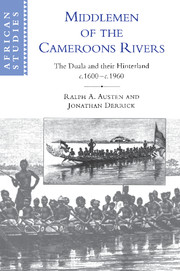Book contents
- Frontmatter
- Contents
- List of tables
- Preface
- List of abbreviations
- Map
- 1 Introduction
- 2 From fishermen to middlemen: the Duala inland and on the coast in the formative period, c. 1600–1830
- 3 Hegemony without control: the Duala, Europeans and the Littoral hinterland in the era of legitimate/free trade, c. 1830–1884
- 4 Mythic transformation and historical continuity: Duala middlemen and German colonial rule, 1884–1914
- 5 Middlemen as ethnic elite: the Duala under French mandate rule, 1914–1941
- 6 Between colonialism and radical nationalism: middlemen in the era of decolonization, c. 1941–c. 1960
- Notes
- Bibliography
- Index
- OTHER BOOKS IN THE SERIES
3 - Hegemony without control: the Duala, Europeans and the Littoral hinterland in the era of legitimate/free trade, c. 1830–1884
Published online by Cambridge University Press: 08 August 2009
- Frontmatter
- Contents
- List of tables
- Preface
- List of abbreviations
- Map
- 1 Introduction
- 2 From fishermen to middlemen: the Duala inland and on the coast in the formative period, c. 1600–1830
- 3 Hegemony without control: the Duala, Europeans and the Littoral hinterland in the era of legitimate/free trade, c. 1830–1884
- 4 Mythic transformation and historical continuity: Duala middlemen and German colonial rule, 1884–1914
- 5 Middlemen as ethnic elite: the Duala under French mandate rule, 1914–1941
- 6 Between colonialism and radical nationalism: middlemen in the era of decolonization, c. 1941–c. 1960
- Notes
- Bibliography
- Index
- OTHER BOOKS IN THE SERIES
Summary
For our understanding of the Duala as a middleman community, the nineteenth century is the classical era. In strictly chronological terms, these decades constitute a middle period between the establishment of an autonomous Duala trading position on the Cameroon coast and its displacement by European colonial rule. It is also from this time, as indicated previously, that most of our information about the precolonial Littoral world is derived. Finally, the nineteenth century saw the full articulation of a hierarchical structure descending from Europeans who crossed the ocean, through the Duala on the coast and the Littoral river system, down to the peoples of the Littoral hinterland.
During the nineteenth century the volume of trade and its spatial boundaries constantly expanded, with the initiative always reflecting the hegemonic position of Europeans over Duala and Duala over the interior. At the same time no political structures evolved to convert this hegemony into orderly control over any of the key points of commercial exchange. But in the complex discourse of middleman historiography, this very absence of control and order has been converted into another form of hegemony, that of cultural identity. From a European perspective, the nineteenth-century Duala represent a failure of legitimacy and freedom: they could not conform to the model of capitalistic self-management proffered by post-slave trade liberal policies and thus had eventually to be incorporated via colonialism into the political system of their overseas trading partners.
- Type
- Chapter
- Information
- Middlemen of the Cameroons RiversThe Duala and their Hinterland, c.1600–c.1960, pp. 48 - 92Publisher: Cambridge University PressPrint publication year: 1999



